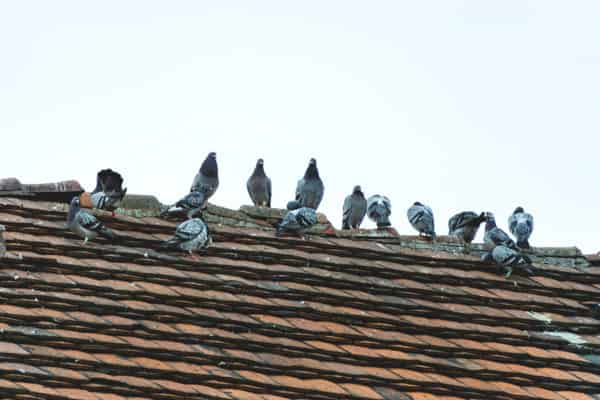Nesting birds can cause much more damage than one may realize. But why would birds want to build their nests so close to humans? Nesting near, in, or on homes actually provides birds with protection from dangerous predators and helps protect them from extreme temperatures in the environment. Birds will build their nests anywhere that fits the criteria they are looking for. They prefer to nest at higher locations so they can survey the area around them for potential predators while keeping their nests relatively hidden. Bird nests can be found just about anywhere on or around your home. In fact, small birds will even nest in gaps in siding, behind shutters, or even on light fixtures.
So a bird built a nest on your home. Is that bird’s nest dangerous? They can be! Bird droppings contain acid that can corrode metal and concrete and even damage car paint. Debris from nests and bird feathers can clog drains and gutters leading to moisture issues. When nests are built in dryer, fan, or stove vents, they can cause clogs that restrict air flow, cause lint to buildup, and significantly increase the risk of fire. Nests that are built inside attics can cause damage to insulation.
Besides the physical damage to your home, bird nests can also cause health issues for humans. Birds carry pathogens that can be dangerous to the health of you and your family. Nests also contain bird droppings which can carry all sorts of bacteria and other pathogens like histoplasmosis. Nests can also contain parasites, ticks, mites, and other pests that can remain long after birds have vacated a nest.
There are also several federal, regional, and local laws and regulations that restrict or prohibit the relocation, removal, or destruction of bird nests. Without knowing for certain what species of bird has inhabited your home, disturbing the nest could be considered illegal and put you at risk for legal ramifications.
The best way to get rid of bird nests is to prevent them from being built in the first place. Here are some steps you can take at home to help prevent birds from nesting in, on, or near your home.
- Eliminate food sources. Birds often nest near homes because they provide an ample supply of food without having to travel far from their nests. Remove food scraps and trash from around your home. Make sure your trash containers are sealed tightly. Keep bird feeders and baths farther out in your yard and only fill them with enough feed for a few birds at a time. Make sure to clean up any spilled birdseed regularly.
- Keep it covered. Birds are notorious for building nests in dryer vents, fan vents, stove vents, and chimneys. Install covers or screens over any open vents. You can also install chimney caps on chimneys. Seal any gaps in siding and shutters.
- Scare them away. Consider installing perch repellents on window sills, ledges, and around the perimeter of your roof. These spikes will prevent birds from alighting on these areas. Consider placing plastic predators like coyotes, snakes, owls, and hawks) on your porch and around your yard. These will spook birds away from your home. Make sure to move them around periodically so the birds don’t get used to them being there. You can also use visual hanging repellents on your porches.
Due to the laws and regulations surrounding bird nest removal and bird protection, it is usually best to call a professional wildlife exclusion company to handle any bird nest issues you may have. These wildlife removal professionals can properly identify the species of bird nesting at your home and properly, humanely, and legally remove it or relocate it from your property.
You May Also Be Interested In:
Which Season is Worst for Bed Bugs?
Pest Control for Businesses: Everything You Need to Know About Commercial Pest Control

